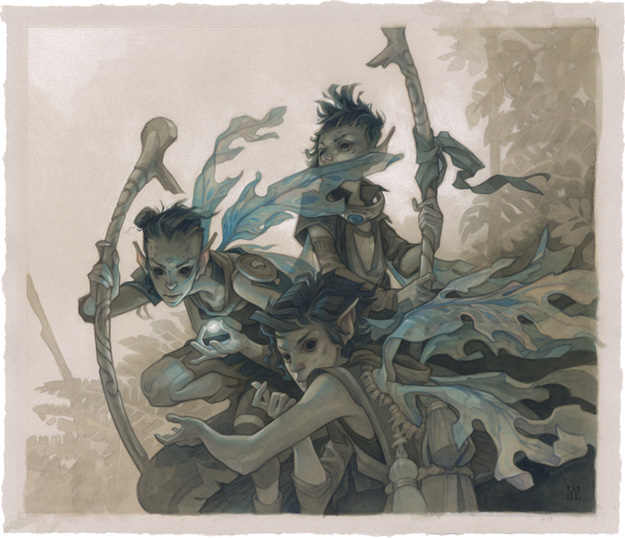
The Art of the Self-Directed Project
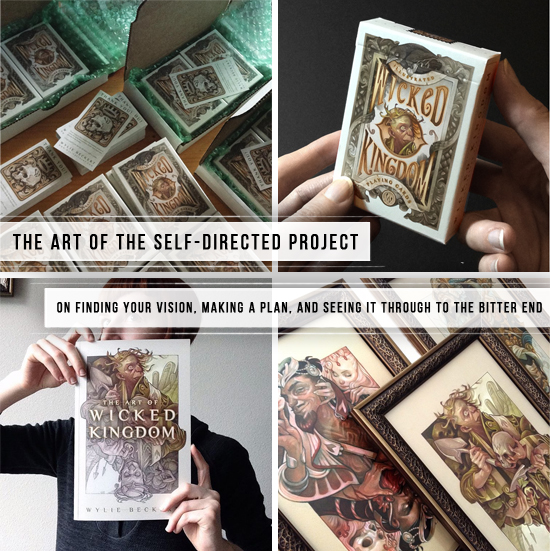
The Wicked Kingdom deck: constructed from equal parts blood, sweat, tears, and Kickstarter monies.
A self-directed project is more than just personal work; rather, it's a focused, coherent body of work with a specific purpose and, even more importantly, a plan.
Why self-directed projects? I've heard the same story from many illustrators older and wiser than I: the business models that once kept artists in top hats and tails are dead or dying; illustration rates have stagnated; prospective illustrators attempt to compete for work with artists in the developing world on price rather than on quality, and the ensuing budgetary race to the bottom ruins everyone.
Don't get me wrong - a lot of artists are able to bring in enough higher-paying work to make it... but, unfortunately, I've never been one of them. My art has always been hard for art directors to place, and in the face of continual discouragement I often wondered if I'd be able to make a living off my art in the long term. When I started my first large-scale, self-directed project (an illustrated playing card deck called Wicked Kingdom) it was in part an effort to prove - even if only to myself - that my work could be marketable.
Although I knew that a self-directed project would be subject to its own ups and downs, I still felt it would offer a stability that I wasn't finding in my client work and create a well from which to draw new content (and potential income) even during commercial dry spells. More importantly, it represented the opportunity to tailor a project to fit my own strengths and interests.
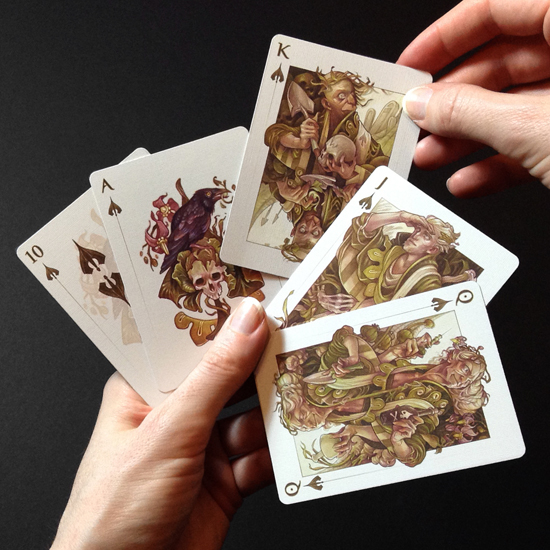
Choose wisely...
I: FINDING YOUR VISION
Redirecting your professional efforts towards a project of your own design can be a daunting task - in part because it requires you to figure out how, exactly, you want to focus those efforts. The question, “What do I want to do?" is so broad that it can be tough to find an answer. Instead, try imagining an inquiry for the perfect commission appearing in your inbox. What type of client sent it? What tone and subject matter are they looking for? What is the final product - and who will want to buy it? What other companies will be eager to hire you when they see this project in your portfolio? Dream as big as you'd like, because chances are this inquiry will never show up - this is a commission you're going to have to assign yourself.
While a successful self-directed project needs to check all your boxes from the very beginning, it's equally important that it sustain its momentum past the initial excitement of starting something new. I've found that the best way to build a project I can commit to in the long term - through the late nights of drawing and the inevitable slump in enthusiasm that happens around the halfway mark - is finding a balance between comfort (what are you already good at doing?) and challenge (what do you want to learn more about?). TheWicked Kingdom project hit this balance perfectly for me - I got to show off my storytelling skills, while exploring a new format and honing my then-new traditional media process.
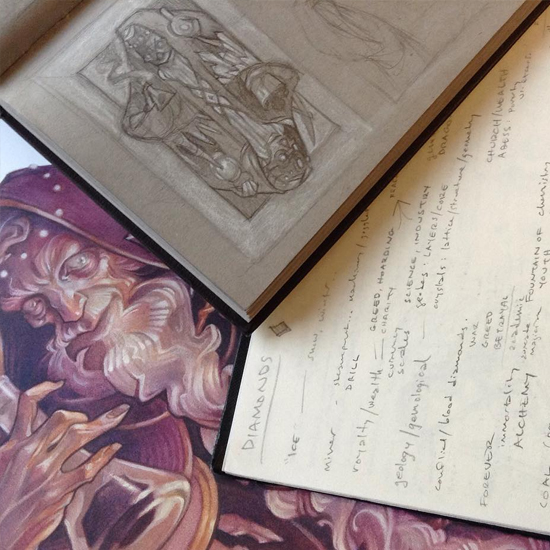
A tiny snippet from the immense sea of notes & sketches that eventually became the Wicked Kingdom deck.
II: THE GAME PLAN
You can think of the early stage of planning as the “soft" stage - exploring your dreams, interests, and inspirations. Next comes the “hard" stage - creating a game plan for your project. A good target to aim for is a coherent body of work (think about the overall arc of your creation - how you'll link everything together visually and thematically) with a clear purpose. What will it BE? An instructional series? A graphic novel? A card deck? Whatever form your project takes, make it something concrete - your decisions here will shape the project specs, and determine the course you'll take to realize the finished product. It's never too early to start thinking about your project from a commercial standpoint. Can you monetize the intermediate stages along the way? How will you market the finished product, and to whom? I knew Wicked Kingdom would appeal to my existing fans in the fantasy art community, but I also hoped that adapting my artwork into the universally-palatable format of a card deck would help the project spread even further.
While you're deciding what form your project will take, be sure to consider the practical aspects. It's important to evaluate the volume of work and how long each piece of the project will take to complete - especially if you'll be working on it in the spare hours between commissions or outside your day job. I chose to illustrate a poker deck in part because it represented a manageable body of work: twelve face cards, four aces, two jokers, a card back, and a package design. I expected to be able to complete two paintings a month and wrap up the project in a year. In actuality I spent about a year and a half on the artwork, which was often forced to the back burner by commissions and other distractions... But that initial timeline gave me something to measure my progress against, and counting down to the last painting gave me a light at the end of the tunnel to push towards.
It's also a good idea to take into account your current skill level, and where you are in your career. If you're just starting out, steer clear of huge, sprawling projects; since your style and skill set are still evolving (or at least, they should be!) your best work now may look clumsy alongside your best work a year from now, making it harder to create a cohesive collection of work. Even though I was fairly confident in my skill set when I started the Wicked Kingdom deck, I occasionally felt limited by the style and techniques I had settled on early in the project. Choosing a smaller project gives you a better training ground to hone your style and improve your technical skills.
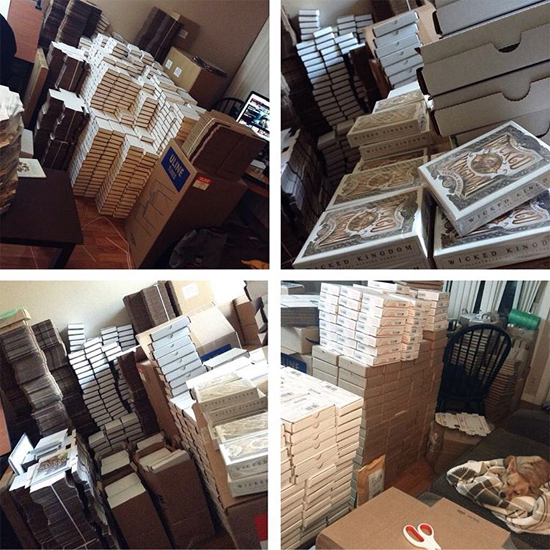
This is what Kickstarter fulfillment in a one-bedroom apartment looks like.
III: THE EXECUTION
As if planning the artwork wasn't complex enough, turning your vision into a salable product presents its own set of challenges. There are a ton of companies out there that will offer to manage, promote, and fulfill your project for you (I heard from a LOT of them over the course of Wicked Kingdom), but until you've had some firsthand experience of your own, it's hard to evaluate what sort of return on your investment you'll get from outsourcing these critical tasks... or if the professionals who are offering their services even know any more about the process than you do!
Ultimately, I decided to be as hands-on as possible with Wicked Kingdom. After all, who could possibly care more about the success of the project than I did? I managed every aspect of the project myself from social media promotion to sourcing merchandise to unloading palettes and boxing each of the 4500+ shipments, and while it added up to a grueling couple of months (made all the more stressful by the fact that almost every aspect of the process was new to me) I don't regret the decision. I had complete control over how the project was presented to the world - a major concern, since it would bear my name in perpetuity - and I was able to track where every dime was spent. In the end, I came away with the undivided profits and a wealth of experience to draw from for my next project.
If you decide to follow my example and tackle the bulk of the work yourself, start researching the technical aspects of production and fulfillment early on . A successful project has a lot of moving parts, and no detail is too small to consider along the way. Lists are your friend! I kept an enormous to-do list that covered every aspect of the Wicked Kingdom project, and whenever some small worry occurred to me (should I design my own packaging, or hire a professional? Where could I even FIT a thousand boxes?) I tried to convert it into something actionable (mock up some type designs in Photoshop; look into pricing of nearby storage units) and add it to the list. The great thing about the internet is that if you look hard enough, you can find the answer to almost any question... and, if you're lucky, you can identify some of the “unknown unknowns" that are waiting to trip you up in the process.
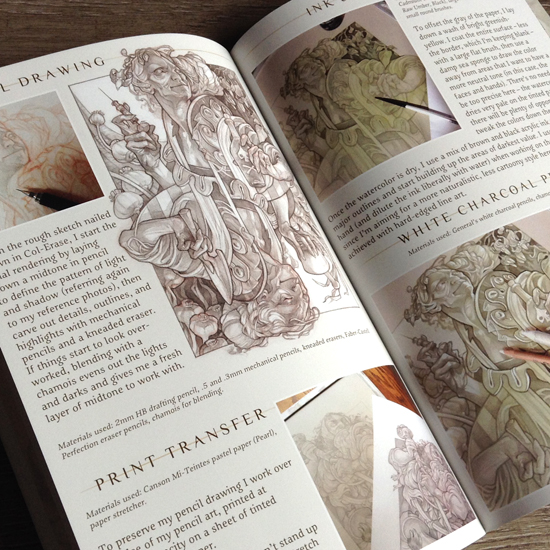
An art tutorial - first created for my supporters on Patreon, later included in the art book.
IV: MAKING IT WORTH YOUR WHILE
While the right self-directed project should feel inherently rewarding to work on, finding ways to monetize the product you're creating is crucial if you're hoping to eventually supplant some of your client work. While the end goal for Wicked Kingdom was a card deck funded through Kickstarter, I tried to find small ways to make the project profitable along the way. I created an online shop to sell the original drawings and paintings; I offered limited-edition prints of the card art; I documented my painting process and assembled the resulting photos, videos, and writings into art tutorials that I released to paying backers on Patreon.
Even viewed as a whole, these income streams didn't represented a full-time income; however, they helped offset the cost of the time I was taking away from commissions, and served as much-needed motivation to choose my sketchbook over Netflix at the end of a long work day. Plus, each scrap of new content gave me something to post on social media, boosting visibility for the project and drawing new followers who would, eventually, become backers for the Kickstarter campaign (you DON'T, under any circumstances, want to be the creator who waits until launch day to tell everyone about their Kickstarter).
If you're not sure how to make money off your project, my best advice is to look at the successful self-directed projects of artists that have gone before you. When I was planning the Wicked Kingdom project, I was inspired by the success of Pete Mohrbacher's serialized Angelarium prints, and by some of the top-funded playing card projects on Kickstarter like Jackson Robinson's Federal 52 and Chris Ovdiyenko's Arcana. Whatever niche you've decided on for your project, do the research! I knew nothing about designing and printing a playing card deck when I started Wicked Kingdom, but by lurking on playing card forums and dissecting the successes (and failures) of past card deck campaigns, I was able to gather the information I needed to build a successful project of my own.
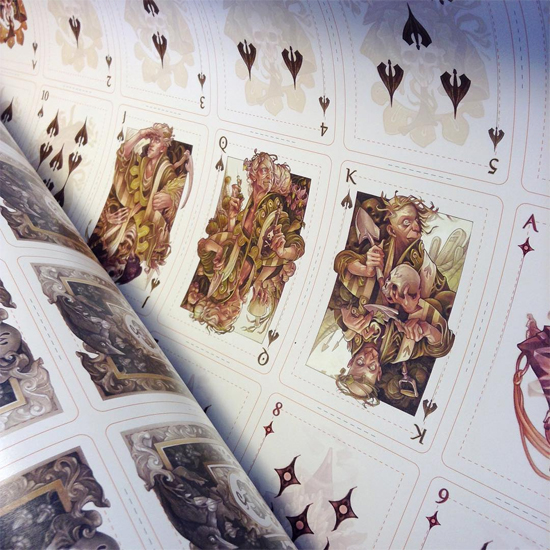
Printer's proofs for the playing card deck: my first glimpse of the project coming to fruition.
V: THE PAYOFF
It can be hard to predict exactly how a project will turn out; while you may be able to make some informed guesses based on the size of your existing fan base and how well other projects of the same kind have fared, there are infinite variables involved, making it impossible to replicate another creator's success. Because of this, self-directed projects - especially if it's your FIRST self-directed project, as Wicked Kingdom was for me - are an uncertain undertaking.
Before you set out to pour countless hours into a project, you should make sure there's more in it for you than just the dream of cash in your pocket. Financial success will, of course, be one of the big targets you're aiming for; but because there are no guarantees, you'll want to ensure that your project offers alternative payoffs in the event that the financial side of things falls short.
Start with something objective and measurable - a goal that defines the success of your project beyond a dollar amount. It doesn't need to be complex; Wicked Kingdom could be seen, at its simplest, as a framework for creating 16-20 personal pieces in the space of about a year. Even if my Kickstarter launch had been a massive flop, I would still have those 20 paintings - to add to my portfolio, submit to art directors, or sell as prints and originals - and I would have generated a year's worth of social media posts showcasing my progress and reminding potential clients and fans that I existed.
Finally, you'll want to strive for a goal that's personally meaningful. It can be about forming connections (with fans, other artists, or previously unexplored corners of the industry) or about learning and self-improvement (the refinement of your artistic process; the mastery of a particular subject matter or of a new set of tools or techniques).
Since all projects must come to an end eventually, think about how you will handle your project's success (or failure) productively. Just as you examined other creators' projects while you were in the planning stages, you'll want to use the closing chapter of your project as an opportunity to evaluate your own efforts and results. Which goals did you achieve? What details did you nail the first time around, and what could have been improved upon? Find a way to translate the experience you've gained into greater success for your next self-directed project... Because there WILL be another self-directed project...won't there?
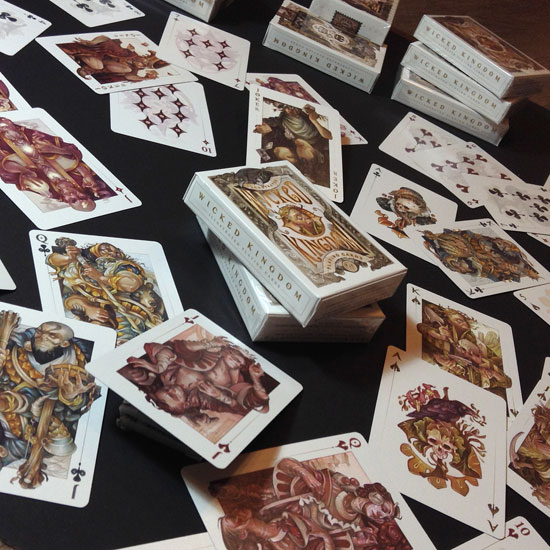
From many, one.
POSTSCRIPT: SOME NOTES ON FANBASE
I owe much of Wicked Kingdom's success to the nebulous and mysterious force that is my fan base - all the people who have followed me on social media, bought my art, and backed my Kickstarter. Where did they come from? Why are they here? Will they leave me unexpectedly one day when a prettier, younger artist comes along (possibly Micah Epstein)?? Sadly, I don't have any verifiable answers to any of these questions (and thanks to some recent algorithm changes by platforms like Facebook and Instagram, it's getting harder and harder for creators to share their art with the people who want to see it). All I can offer is a few general notes on things I've done over the course of my career which may have contributed to developing a fan base. My rules:
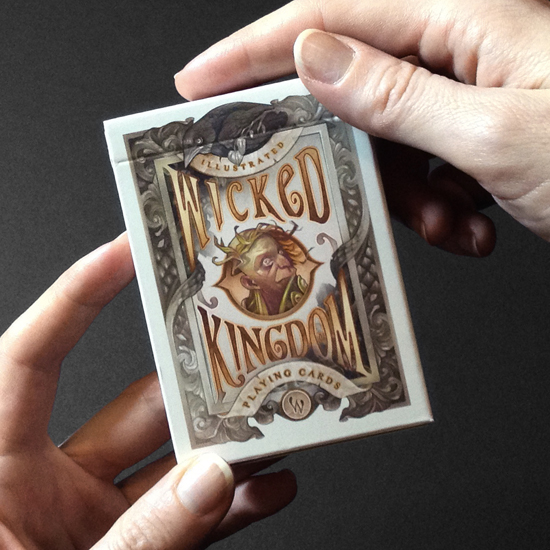
Yes, you can trade your hard-earned money for this thing.
SHAMELESS SELF-PROMOTION
If you missed the Kickstarter, you can still buy the Wicked Kingdom deck (and the art book documenting its creation) below. You can find prints and original artwork from the project in the shop HERE. You can get all the tutorials from the Wicked Kingdom project with a $5 pledge on Patreon at www.patreon.com/wyliebeckert; you'll also be helping to make my next project a reality.
Huge thanks to everyone who has supported me in the pursuit of my self-directed work; I couldn't have done it without you! I hope you'll join me for what's to come...